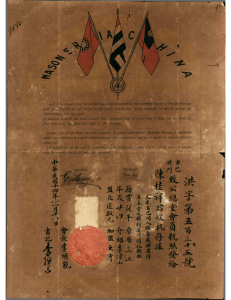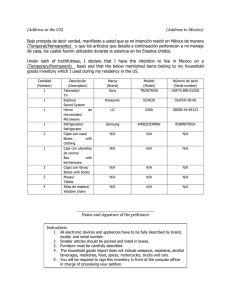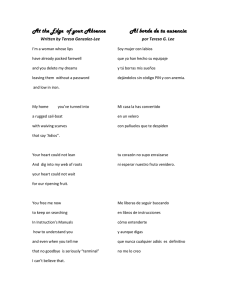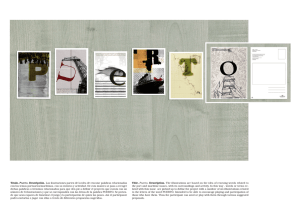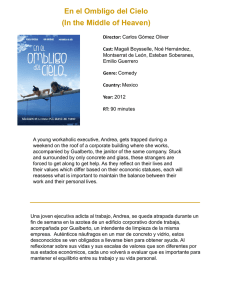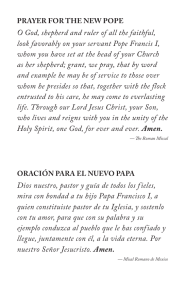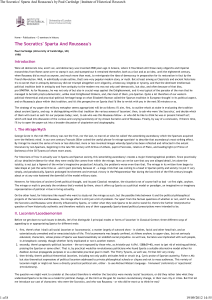Manuel González Prada: Grafitos Translation by G. J. Racz
Anuncio
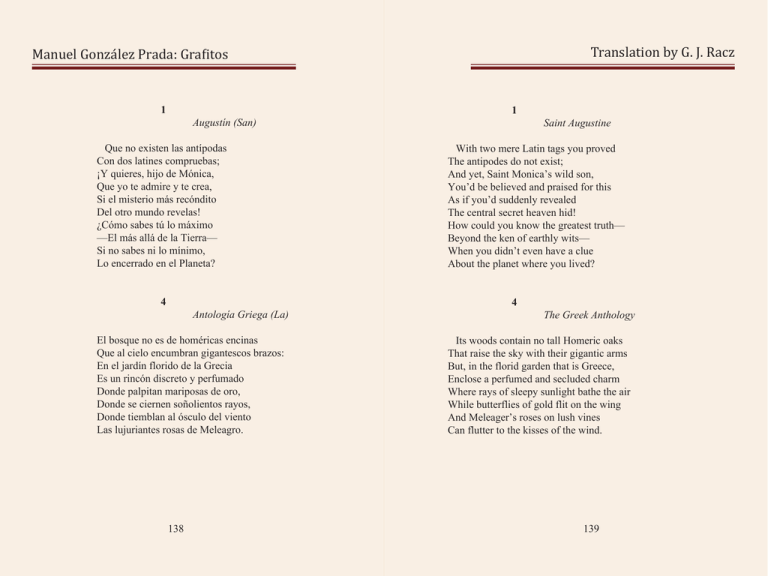
Translation by G. J. Racz Manuel González Prada: Grafitos 1 Augustín (San) 1 Saint Augustine Que no existen las antípodas Con dos latines compruebas; ¡Y quieres, hijo de Mónica, Que yo te admire y te crea, Si el misterio más recóndito Del otro mundo revelas! ¿Cómo sabes tú lo máximo —El más allá de la Tierra— Si no sabes ni lo mínimo, Lo encerrado en el Planeta? With two mere Latin tags you proved The antipodes do not exist; And yet, Saint Monica’s wild son, You’d be believed and praised for this As if you’d suddenly revealed The central secret heaven hid! How could you know the greatest truth— Beyond the ken of earthly wits— When you didn’t even have a clue About the planet where you lived? 4 4 Antología Griega (La) The Greek Anthology El bosque no es de homéricas encinas Que al cielo encumbran gigantescos brazos: En el jardín florido de la Grecia Es un rincón discreto y perfumado Donde palpitan mariposas de oro, Donde se ciernen soñolientos rayos, Donde tiemblan al ósculo del viento Las lujuriantes rosas de Meleagro. Its woods contain no tall Homeric oaks That raise the sky with their gigantic arms But, in the florid garden that is Greece, Enclose a perfumed and secluded charm Where rays of sleepy sunlight bathe the air While butterflies of gold flit on the wing And Meleager’s roses on lush vines Can flutter to the kisses of the wind. 138 139 8 Biblioteca de Rivadeneira (La) 8 Rivadeneira’s Library of Spanish Authors Mercado y joyería, Legumbres y diamantes, Enfiladas de perlas Y sartas de tomates. A market and a jewelry shop Where greens and diamonds may be viewed, His shelves are lined with strings of pearls And rows of ripe tomatoes, too. 20 20 D’Annunzio Gabriele D’Annunzio Egolátrico poeta, Plebeyesco superhombre, Tras la annunziana careta Deja ver el burdo nombre: Gaetano Rapagneta. Self-worship clouds those poet eyes, A superman your lowborn claim; Behind that nunzio disguise The clumsiness of your real name, Gaetano Rapagneta, lies. 23 23 Daudet (Alphonse) Alphonse Daudet Un puñado de sal ática, Y su quiño a la Gramática. A fistful of his attic wit Punched Grammar, proving adequate. 31 31 France (Anatole) Un gran demoledor a la sordina: Se ríe de los hombres; sube al cielo, Y como el galo al senador de Roma, Le tira de la barba al Padre Eterno. 140 Anatole France A surreptitious demolitionist, He laughed at men and, once at heaven’s throne, Plucked our Eternal Father’s beard much like That Gaul did to a senator of Rome. 141 33 Gautier (Théophile) 33 Théophile Gautier Veme al pie de su sepulcro, Oh maestro del decir, Repitiendo con Ovidio Ego sum barbarus hic. No te ofrezco yo las flores De un efímero jardín; Sólo murmuro tus versos, Condoliéndome de ti. ¡Pobre Theo, condenado A envejecer y morir, Embalsamando con néctar El imbécil folletín! He sees me by his sepulcher, This master of rhetorical skill, Repeating words that Ovid once Spoke: Ego sum barbarus hic. I haven’t come to bring you flowers From faded plots as offerings, But only wish to voice your verse As comfort for your perishing. Poor Theo, sentenced fatefully To old age and the burial pit, Embalming all those dumb feuilletons In nectar from that cold abyss. 47 47 Lamartine ¿Qué sus ideas? Músicas íntimas. ¿Qué sus palabras? Estrofas rítmicas. Todo en él canta —Nervios y vísceras— Que no es un hombre Sino una cítara. 142 Alphonse de Lamartine The ideas he conceived? A sweet polyphony. What then the words he penned? One lyric rivulet. The whole of him did sing— Heart, soul, nerves, viscera— A zither, not a man, A life mellisonant. 143 50 León XIII (poeta) 50 Pope Leo XIII (as a Poet) Composiciones latinas Te da, Pecci, en escribir; Digo yo: —¡Beatus ille Que no comprende el latín! Insist upon composing texts In Latin, Pecci, while you’re pope? I say: Beatus ille he Who can’t make out a word you wrote. 52 52 Lucrecio Lucretius Tú del Olimpo arrojas al Tirano, Y sólo ves la Nada y el gusano En el reino inviolado de la muerte. Eres, oh gran pagano, Manjar de libres, demasiado fuerte Para el servil cerebro de un cristiano. You’d toss the Tyrant off Olympus, blind To all in death’s inviolate realm, resigned But to the worms in void’s domain. Great pagan, you’ve the kind Of thought freethinking men devour, a brain Too weighty for the servile Christian mind. 54 54 Moratín (L. F. de) Cuando quiere traducir A los Shakespeare y Molière, Le podemos devolver Lo que él solía decir: —Pobre Leandro, a mi ver, Tu locura hace reír: ¿Quién te induce a traducir Lo que no sabes leer? 144 Leandro Fernández de Moratín Since he made up his mind one day To translate Shakespeare and Molière, We’ll hazard that it’s only fair To echo what he used to say: My poor Leandro, I declare! Your folly makes us laugh away: Why choose a foreign-language play When you can’t make the words out there? 145 57 Nietzsche 57 Friedrich Nietzsche No el superhombre ni el quídam, No el Mesías ni Luzbel: Es, más el bluff y la pose, Un don Quijote al revés. No superman or quidam he; Messiah, no; not Lucifer— More like a bluffer with a pose, A Don Quixote in reverse. 63 63 Pereda José María de Pereda Al mirar sus novelones, bostezamos; Al leerlas, nos dormimos y soñamos, Que es Pereda un energúmeno carlista Disfrazado con la piel de novelista. Just seeing his clunky novels makes us yawn; To read them makes us sleep and dream till dawn. Possessed by Carlist imps, Pereda eyes His pen and ink, a novelist in disguise. 64 64 Pi y Margall Francisco Pi y Margall —¡Colgadle el sambenito! ¡No haya con él blandura ni piedad! —¿Me dicen su delito? —Escribir en España la verdad. “He must be shamed for it! Show him no mercy! Let him feel the pain!” “What crime did he commit?” “The fellow dared to write the truth in Spain!” 70 70 Rousseau A gritos iba pidiendo El misántropo Rousseau La corona en el Parnaso Y la jaula en Charenton. 146 Jean-Jacques Rousseau Jean-Jacques Rousseau, fierce misanthrope, Pursued dual quests with whoops and yells: A crown on Mount Parnassus and, In Charenton, a madhouse cell. 147 76 Spencer 76 Herbert Spencer Estupendo filósofo Con antiparras de color inglés, Ave que enfrena sus rebeldes ímpetus Con un torzal burgués. Philosopher supreme, He looked at life through English-coloured specs, A bird who stayed his rebel excesses With bourgeois counterchecks. 77 77 Teresa (Santa) Saint Teresa Virgen sin pecado fue, Que en la secta de Jesús No es un pecado el pecar Contra el sentido común. A virgin without sin or stain For, in Lord Jesus’s pure sect, It’s not considered sinning when The sin transgresses common sense. 86 Zola El declara guerra al ocio Y escribiendo de desvela: Hace al año su novela… Hace también su negocio. Hoy altivo, amenazante, Vertiendo luz de sus manos, Alza en un circo de enanos Su cabeza de gigante. 148 86 Émile Zola His war on leisure a crusade, He wrote at night when sleep was near; Producing novels one each year, He diligently plied his trade. Now menacing and terrible, Light emanating from his hands, The view his giant’s head commands Is of a midget carnival. 149
